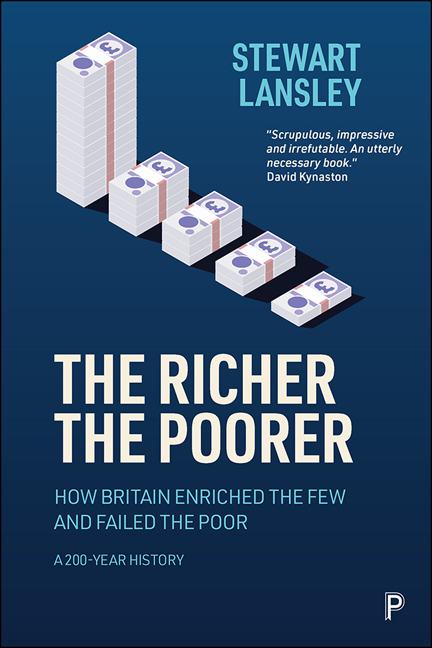Book contents
- Frontmatter
- Miscellaneous Frontmatter
- Dedication
- Epigraph
- Contents
- List of figures
- Preface and acknowledgements
- Introduction: Knighthoods for the rich, penalties for the poor
- PART I 1800–1939
- PART II 1940–59
- PART III 1960–79
- PART IV 1980–96
- PART V 1997–2010
- PART VI 2011–20
- Afterword: COVID-19 and ‘the polo season’
- Notes
- Index
26 - Growing rich in their sleep
Published online by Cambridge University Press: 13 May 2022
- Frontmatter
- Miscellaneous Frontmatter
- Dedication
- Epigraph
- Contents
- List of figures
- Preface and acknowledgements
- Introduction: Knighthoods for the rich, penalties for the poor
- PART I 1800–1939
- PART II 1940–59
- PART III 1960–79
- PART IV 1980–96
- PART V 1997–2010
- PART VI 2011–20
- Afterword: COVID-19 and ‘the polo season’
- Notes
- Index
Summary
Despite ongoing austerity and repeated government promises to check excess, the executive pay gravy train continued to roll. The average pay of a FTSE 100 chief executive rose at four times the pace of employees in the decade from 2009. In the two years to 2021, Denise Coates, the chief executive of the privately owned online gambling firm Bet365, took ‘pay’ of over L800 million, while fifteen global hedge fund managers pocketed L17 billion between them for betting correctly on the course of the global economy.
While top incomes reached new heights, Britain had also seen a fourdecade long surge in the pool of privately owned wealth. Over this period, UK private holding of capital (a mix of property, physical and financial wealth) grew at slightly more than twice the rate of incomes, rising from three to more than six times the size of the economy. As in the nineteenth century, most of this growth has been captured by the already wealthy, reversing the earlier long-term trend towards greater equality, while the share held by the poorest half, a key measure of economic and social progress, fell. Moreover, as Ben Tillett declared a century earlier, little of this surge in wealth has been ‘conscripted’ for the common good, with the revenue from capital taxes raising a fraction of the total tax take. As with incomes, official statistics have understated the full extent of wealth concentration because of the way a large part of personal wealth is hidden in tax havens such as Panama and Luxembourg.
Giving everyone a stake
Wealth, and how it is generated and shared, matters. A significant increase in private wealth in relation to economic output is not necessarily a sign of a healthy economy and wider economic progress. A boost in private wealth levels that was driven by long-term innovation, for example, would also raise the rate of return on investment and thus the growth rate, so the ratio of wealth to output might not become significantly higher. Rather, the rising wealth-to-income ratio of recent times has been driven by a number of other factors that are more likely to be associated with negative economic and social outcomes. These drivers include the transfer of formerly public assets into private ownership and artificially created inflation in asset prices.
- Type
- Chapter
- Information
- The Richer, the PoorerHow Britain Enriched the Few and Failed the Poor: A 200-Year History, pp. 231 - 238Publisher: Bristol University PressPrint publication year: 2021



